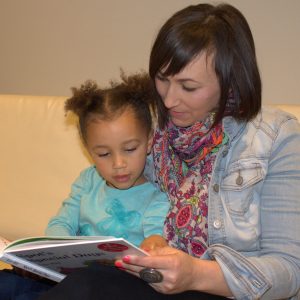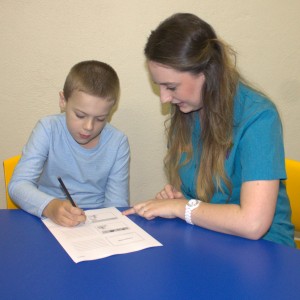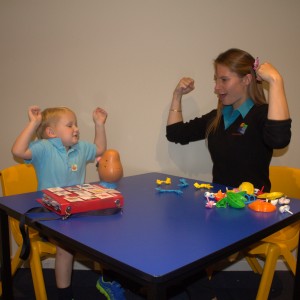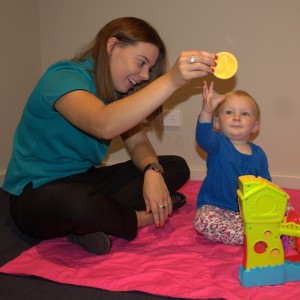 Are you wondering if speech therapy is what your child needs? Read on to find out more.
Are you wondering if speech therapy is what your child needs? Read on to find out more.
When should I call a speech pathologist? Speech pathologists can help when kids have problems with communication, including speech, language, literacy and social communication. See below for how speech pathology can help in each of these areas.
How do I know if my child has problems with speech skills? Children would benefit from an assessment of their speech sounds if:
- they are difficult for familiar people to understand by the age of two years
- they are difficult for strangers to understand by the age of three years
- they leave many sounds off the beginnings, middles or ends of words after two years of age
- their speech sounds "slushy" or "nasally"
- they have not developed use of the following sounds by these ages:
- 3 years – m, n, h, p, w, d, g, y, k, f, b, t
- 4 years – sh, ch, j, l
- 5 years – r, v
- 6 years – s, z
- 8 years – th
 What about language skills? Language skills include both comprehension of what others say (called receptive language) and using language to communicate ideas to others (called expressive language).
What about language skills? Language skills include both comprehension of what others say (called receptive language) and using language to communicate ideas to others (called expressive language).
Receptive language difficulties include problems with :understanding words, sentences and concepts. This may show up as a difficulty with following instructions, answering questions, remembering and understanding information at school or understanding what is read.
Expressive language difficulties include problems with: using words, word endings and grammar, forming sentences and texts such as stories. This may show up as a difficulty with expressing ideas or putting ideas down on paper.
How do I know what to expect for my child's age? Children develop communication skills in a predictable sequence and research has calculated the age at which most children develop different skills and the ages at which some children show signs that they need extra help. Click here to download a checklist to see how your child is progressing for their age.
Does it matter if my child is a bit behind with their speech or language? Yes it does matter because research has shown that children with delayed speech and language skills can go onto to have difficulty with literacy and learning. There has also been research to show that children with speech and language difficulties are more likely to have social and emotional problems and behaviour issues. Therapy to improve communication skills can reduce the risk of these issues later on.
 Is my child too young? If they are old enough for you to be concerned that they are not developing as expected they are probably not too young to benefit from support. Therapy for young children works around play based activities and supporting parents to help their child learn and can be effective for children from around 18 months. Some children who have an increased chance of having communication difficulties such as children with Down's syndrome, autism, hearing loss and other disabilities may benefit from support even earlier.
Is my child too young? If they are old enough for you to be concerned that they are not developing as expected they are probably not too young to benefit from support. Therapy for young children works around play based activities and supporting parents to help their child learn and can be effective for children from around 18 months. Some children who have an increased chance of having communication difficulties such as children with Down's syndrome, autism, hearing loss and other disabilities may benefit from support even earlier.
Won't they just grow out of it? They may or they may not. Some children do seem to "just catch up" but others have ongoing problems with learning and literacy as well as social interactions and self esteem. It is hard to tell which way a child will progress. If they are in the "catch up group" therapy will help this happen even quicker. Don't take a chance on your child's future.
 I think they could talk if they wanted to! Parents often say this but it doesn't really make sense. Many children who can't talk go to all kinds of effort to get their point across, pointing and gesturing and making noises or working hard to try to do things all by themselves. Some also get very frustrated and maybe even have tantrums because no one understands what they want. Talking is a very useful way to get what you want and what child wouldn't like that. It's is also quicker and easier in most cases than communicating in other ways, so I think most kids would choose to talk if they could do so.
I think they could talk if they wanted to! Parents often say this but it doesn't really make sense. Many children who can't talk go to all kinds of effort to get their point across, pointing and gesturing and making noises or working hard to try to do things all by themselves. Some also get very frustrated and maybe even have tantrums because no one understands what they want. Talking is a very useful way to get what you want and what child wouldn't like that. It's is also quicker and easier in most cases than communicating in other ways, so I think most kids would choose to talk if they could do so.
A speech pathologist can help work out why your child is finding it hard to talk and can help them learn these skills. Some kids need alternative ways of communicating that work better than tantrums to help them express themselves and reduce their frustration while other skills are developing. A speech pathologist can help with that too.
My child doesn't talk at all so how can a speech pathologist work with them? Speech pathologists work on communication which begins well before speech happens. Speech pathologists can help your child develop the skills needed to communicate and then move on to helping speech develop. Some kids also benefit from learning an alternative way of communicating such as signing or picture symbols. For most children this will be a temporary thing to reduce frustration and kick start the communication process.
 Won't sign language or picture communication stop my child from learning to talk? Parents often worry about this but research has shown that signing and alternative communication systems actually make children speak more quickly. It also helps a child to develop vital communication skills and confidence in their ability to express themselves and relate to others. Find out more about PECS (picture exchange communication system) here.
Won't sign language or picture communication stop my child from learning to talk? Parents often worry about this but research has shown that signing and alternative communication systems actually make children speak more quickly. It also helps a child to develop vital communication skills and confidence in their ability to express themselves and relate to others. Find out more about PECS (picture exchange communication system) here.
My child is beginning to stutter. Can speech therapy help with that? Yes stuttering is most effectively treated in children, though adults can benefit from therapy as well. Speech pathologists use techniques shown by research to be effective in reducing stuttering. There are techniques which work for preschool children and others that work for older children and teenagers as well. Find out more about stuttering therapy for young children here.
My child talks fine but has issues with reading and writing. Why would a speech pathologist help? Reading and writing are forms of communication and are based on spoken language. Speech pathologists can help children with learning the connection between letters and sounds, understanding written information and using letters, words and grammar to form written sentences and larger pieces of writing such as stories.
 Can it make a difference? Speech pathology can help you to learn your child's strengths and weakness in understanding and using speech, language and literacy and develop ways to improve skills in areas of need. This leads to better communication, which leads to increased confidence and better social interactions as well as improved learning and literacy skills, both now and in the future.
Can it make a difference? Speech pathology can help you to learn your child's strengths and weakness in understanding and using speech, language and literacy and develop ways to improve skills in areas of need. This leads to better communication, which leads to increased confidence and better social interactions as well as improved learning and literacy skills, both now and in the future.
How can I book an assessment? Booking is easy. Just call (08) 8255 7137 and our friendly receptionist can help you make a time that suits.
Talking Matters provides speech pathology, occupational therapy and psychology services for children. We have a range of service options including individual therapy in our bright, child friendly clinics in Elizabeth Downs and Tanunda as well as many school based services. We also do group programs and home or child care visits by negotiation. To find out more browse our website. To find more information and resources for supporting children with special needs follow us on Facebook, Twitter and Pinterest.
Whether you live locally and can come in and see us, or are further afield and want to make use of our extensive range of free resources, we look forward to sharing our passion for helping kids learn and develop.
Jo Brenecki
Related Blog Posts
If you liked this post you may also like:
Boost brain power!
Benefits of yoga for children
The Benefits of Joint Speech Pathology and Occupational Therapy Sessions (SPOT)
Developmental delay



